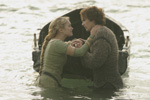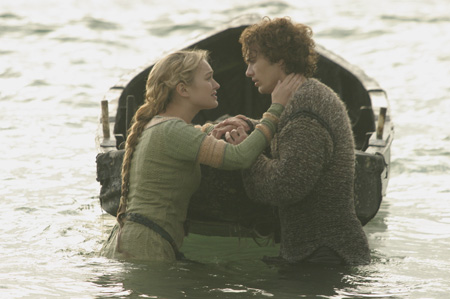Tristan and Isolde
 “Britain – The Dark Ages,” reads the title card at the beginning of this movie. The Irish, we’re informed, must not be allowed to unite against the Britons, or the Britons will fall. The title cards for the theatrical trailer read, “Before Romeo and Juliet…” I’m certain the only reason they failed to mention this tale predates even…
“Britain – The Dark Ages,” reads the title card at the beginning of this movie. The Irish, we’re informed, must not be allowed to unite against the Britons, or the Britons will fall. The title cards for the theatrical trailer read, “Before Romeo and Juliet…” I’m certain the only reason they failed to mention this tale predates even…

Isolde (Sophia Myles) bids farewell to Tristan (James Franco).
Photo credit: Rico Torres. ©2005, Twentieth Century Fox Film Corp.
“Britain – The Dark Ages,” reads the title card at the beginning of this movie. The Irish, we’re informed, must not be allowed to unite against the Britons, or the Britons will fall. The title cards for the theatrical trailer read, “Before Romeo and Juliet…” I’m certain the only reason they failed to mention this tale predates even Malory’s [i]Le Morte d’Arthur[/i], and could be therefore regarded as the basis for the Lancelot-Guinevere romance, is because the target audience’s English teachers have failed miserably at imparting upon their students the historical relevance of Arthurian legend in Medieval literature… but nevermind.
Wide shots of strange, rocky lands occupy the first few minutes of the film. However, just as I’m getting used to the idea that there could be some startlingly-good cinematography to come, I’m struck with two observations: The camera movement is awkwardly mechanical in places where it should flow as the landscape does, and the color appears terribly washed out—though I suspect the latter could just as well have been due to the projectionist keeping the projector bulb unnecessarily dim. Nonetheless, my experience was rather hampered by the combination of poor contrast and mediocre camera work.
A young boy hunts with his father. We’re immediately cued into the fact that this must be Tristan, because he looks contemplatively at the rabbit he’s about to kill. This is exposition knocking brazenly at our door to inform—no, declare—that this must be the sensitive hero because he feels conflicted about killing bunnies. I’d like to lock him in a room with Samwise Gamgee for five minutes, but that’s another story.
As Lord Marke (Rufus Sewell) talks about establishing peace for the Britons, they’re ambushed by a band of Irish warriors who set the fort ablaze and massacre the locals. Tristan is shooed down a trap door. He emerges to find his family and many others slaughtered. Lord Marke, more or less, adopts him. During some mock swordplay, Tristan is picked on by his stepbrother, Melot (Henry Cavill). However, Tristan quickly demonstrates his innate skill at swordfighting which he, of course, possesses because he is the protagonist. It’s surprising, frankly, that he doesn’t wear a cape with a big “T” on it.
As good and evil in such tales of unrequited love juxtaposed against the backdrop of war are never so complicated as in real life, we have our Evil and Demanding King Donnchadh (David O’Hara). If he wants someone dead, he has but to ask. His daughter, Isolde (Sophia Myles), whose mother, she believes, died of a broken heart… as opposed to any number of typically-untreatable infectious diseases of the day. It’s not the cliché of the mother dying, or even of the mother having been said to have died of a broken heart, that bothers me. No, it’s the fact that the actor playing young Isolde is forced by the director to utter such a worthless line.
Years later, Isolde is betrothed to, naturally, the ugliest guy this side of Cornwall. He brandishes before Isolde a rather large poison-tipped sword… Is this just a bad metaphor, a foreshadowing (live by the sword, die by the…), or both? Is it a coincidence Isolde knows that the antidote consists of, among other things, Yohimbe? Reasonably expected, I wouldn’t be spoiling anything by telling you this, but if you have your reservations about even the slightest detail, stop reading now (you’re better off seeing “Brokeback Mountain,” anyway).
For those of you who continued, Tristan is cut by the poison sword and… guess whose shore he just happens to wash upon? That’s right, the one herbally-proficient princess in all of Ireland. But from here, if the story had my interest at all up to this point, it progressively loses it, scene after scene. There’s no chemistry between Tristan and Isolde. By this I don’t mean that there should have been big actors with magical chemistry.
Actors in a romance, you would think, should at least be capable of conveying the chemistry between their characters, even if they have none between themselves. But there’s no such impression left upon me. So much so that each time that the two lovers meet on their brief, unspirited trysts after Tristan wins her for Lord Marke in a tournament arranged between the warring factions as a means of aligning the powers… against what, I’m not really sure. There’s really no mechanism to motivate that, and if Tristan and Isolde had already loved each other it would only have taken so much as a brief conversation between Tristan and Marke, who supposedly care so greatly for each other to resolve the situation for all concerned. You’d think Marke would have understood and made some sort of secret deal with Tristan. Marke even chooses Tristan as his number one, but under completely off-key direction, Sewell portrays Marke as though he’s flaunting Isolde as a trophy before Tristan… which is not the way Marke’s nobler character has been established up to that point.
Along with the dispassionate PG sex, you simply don’t care about anything that happens to Tristan and Isolde. A weird thing happened when Tristan (or Isolde… honestly this movie is so forgettable, I don’t care that I already forgot who) said, “We’ve known it from the start.” I thought, “The start? What, fifteen minutes ago?” I looked at my watch and already an hour had transpired. It’s not that I felt the movie was spinning along quickly. It just felt like only a handful of events had transpired in that entire time.
When they are finally, and inevitably, discovered, note that the approaching party on horseback cannot be heard practically until they actually enter the frame. It’s as if the writer’s couldn’t think of any cleverer a way for them to be discovered than this standard “screwing around in the forest and WHOOPS a bunch of men on horseback show up” deal, and it just seems thrown in for good measure… as if some studio executive looked at focus polls and decided, “This needs a scandal.” Well, I think there’s bigger scandal to be had in Rufus Sewell’s periodically-drifting eyeball (which does kind of give him away in a Snidely Whiplash-sort of way)… but apparently the executives at Fox didn’t think to capitalize on that as much as they could have. So instead, they give us, “Oh, snap… twelve guys on horseback.”
The story doesn’t carry the emotional weight of a true Shakespearean tragedy, though, as mentioned before, the marketing compares it to one of his most famous. It also lacks the lightness of foot of Shakespeare’s comedies, which I feel were in many ways more complex, politically-intriguing, and bitingly satirical statements about class conflict than any of his tragedies. But it tends to be assumed that a tragedy confers implicitly a higher stature than all other forms of drama. This is a demonstrably false presumption, and nowhere is it more evident than in this hack-job of a copy of an ages-old archetypal tale of unrequited love between the Brahmin and the untouchable. Am I the only one who finds it hilarious that this film did less to unite its British and Irish characters than “March of the Penguins” (as was comically-intoned during last night’s BFCA Critics’ Choice Awards) did to reunite the French and the American people?
 Tristan and Isolde • Dolby® Digital surround sound in select theatres • MPAA Rating: PG-13 for intense battle sequences and some sexuality. • Distributed by Twentieth Century Fox Film Corp.
Tristan and Isolde • Dolby® Digital surround sound in select theatres • MPAA Rating: PG-13 for intense battle sequences and some sexuality. • Distributed by Twentieth Century Fox Film Corp.